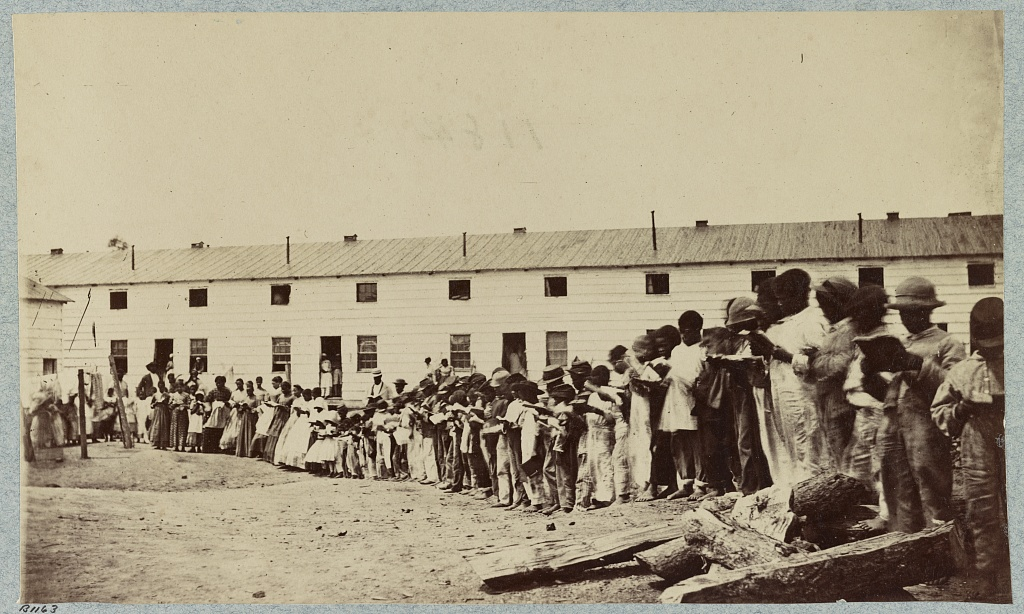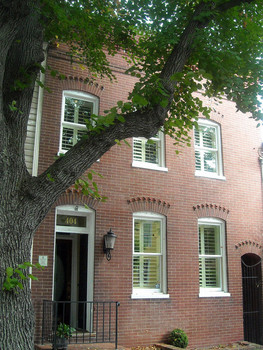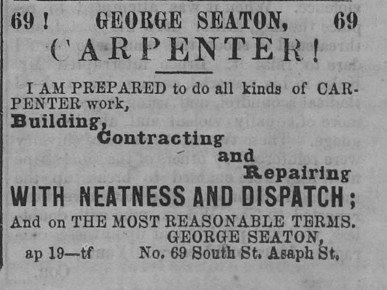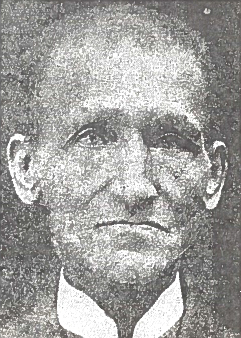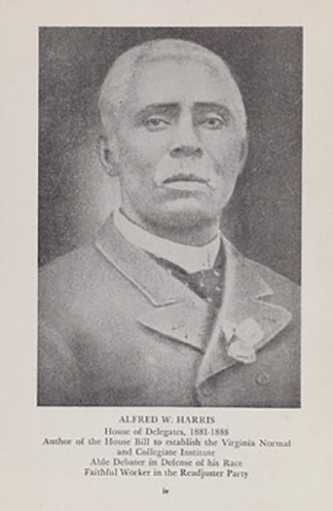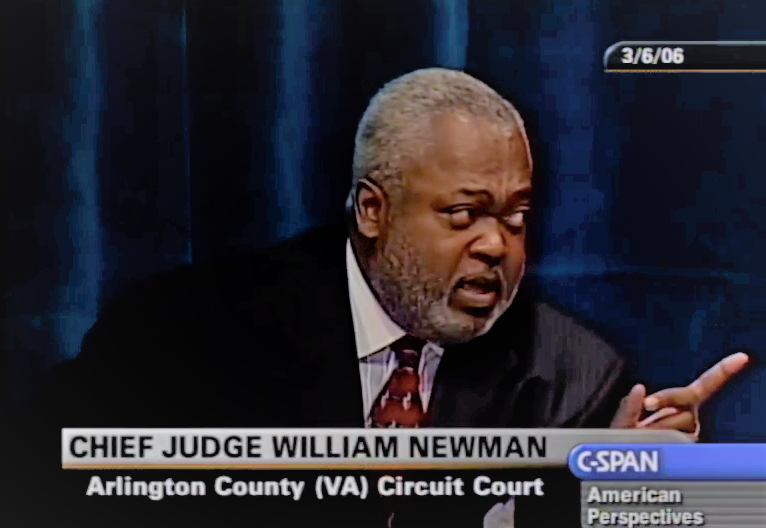On March 30, 1870, the 15th Amendment was ratified, extending the right to vote to all male citizens - regardless of race or if they had previously been enslaved. All of the nation, African-Americans took to the polls, and many became engaged in the political process as elected officials at all levels of government.
Arlington – which until 1920 was known as Alexandria County – was included in this political renaissance, and had a number of prominent Black politicians who won elected office and served as leaders following the Civil War.
However, African-American political organization in the County predates Reconstruction. Freedman’s Village was an epicenter of politics starting in 1865, when community members held a mass meeting that petitioned the military governor to guarantee equal rights. Months later, a group at Freedman’s Village held the first statewide political convention for African-Americans.
Freedman’s Village, pictured above in 1862, was a center of political activity in Arlington both before and after the Civil War. Image courtesy of the Library of Congress.
George Lewis Seaton
In 1869, George Lewis Seaton was elected to the Virginia House of Delegates representing Alexandria.
According to the records of the House, Seaton was the first African American person to hold this position in Alexandria. While in office, Seaton voted to ratify both the 14th and 15th amendments. He was also one of six African American men appointed to the grand jury of the United States Circuit Court for Virginia – likely the first interracial jury in the state. This group indicted several Confederate officials for high treason.
Prior to holding office, Seaton worked as a carpenter and also helped establish a local branch of the Freedman’s Savings Bank and Trust Company.
The George Lewis Seaton House on South Royal Street in Alexandria. Image courtesy of Encyclopedia Virginia.
In the May 19, 1868, edition of the Alexandria Gazette, George Seaton advertised his carpentry business. Image courtesy of Virginia Chronicle.
John B. Syphax
John B. Syphax was another Black legislator in Alexandria County. The son of Charles and Maria Syphax, he was born a free person on the Parke-Custis Estate in 1835.
Syphax served in the Virginia House of Delegates from 1874 to 1875, as the County’s treasurer from 1875 to 1879, and as a justice of the peace and county clerk.
John B. Syphax, date unknown. Image from “Arlington County, Virginia: A History,” by C.B. Rose.
Alfred William Harris
At the age of only 20, Alfred William Harris was elected to the Alexandria common council. Born enslaved in Fairfax County, Harris later moved to Alexandria and attended a school organized by the Freedman’s Bureau.
After holding office in Alexandria, Harris went on to serve four consecutive terms in the Virginia House of Delegates, representing Dinwiddie County. His accomplishments while there included introducing the bill that chartered what is now Virginia State University.
Alfred W. Harris photo caption reads: “House of Delegates 1881-1888, Author of the House Bill to establish the Virginia Normal and Collegiate Institute, Able Debater in Defense of his Race, Faithful Worker in the Readjuster Party.” Image courtesy of the Virginia General Assembly.
Learn more: The Dr. Martin Luther King, Jr., Memorial Commission of the Virginia General Assembly has compiled a database of all the African American legislators elected to the General Assembly during the 20th and 21st centuries.
The Long Post-Reconstruction and Jim Crow Era
Black residents of Alexandria/Arlington County eventually held council seats and offices including treasurer, clerk, commissioner of revenue, sheriff, superintendent of roads, and overseer of the poor. H. L. Holmes was one notable officeholder, serving as commissioner of revenue from 1875 to 1903.
But following the initial prominence of Black legislators following the Civil War, for most of the 20th century, Arlington’s government was dominated by white legislators as many of the post-war resources and promises of equality quickly fell by the wayside nationwide. Reconstruction, which lasted from 1866-1877, was the Congressional attempt to reorganize the Southern states and offer support to formerly enslaved individuals. During this time, there was a brief period where African Americans were protected in their right to vote and participate in the political process. This progress was reflected nationally: at one point, there was an African American majority in the South Carolina government, and several African American men were elected to the Senate.
But even during Reconstruction, there were attempts by opponents to undermine support given to African Americans and undo the progress that had been made. Jim Crow law and “black codes” began to emerge during this time – discriminatory laws at the state and local level that systematically denied Black individuals from public accommodations suppressed their right to vote and prevented them from holding public office. Jim Crow laws could be seen in the County as early as 1868 when the Washington and Alexandria Railroad established segregated seating. Groups resembling the Ku Klux Klan also emerged in Northern Virginia during this time, and measures such as the poll tax and dual registration were implemented as early as 1876 in the County to disenfranchise African American voters.
When Reconstruction formally ended in 1877, all of these measures amounted to a systemic suppression of Black Americans’ right to vote and limitation on political power that would last well into the 20th century.
Leaders in the 20th Century & Judge William T. Newman, Jr.
Learn more: "My Hall’s Hill Family," by Wilma Jones; Washington Post article announcing Dr. Edward T. Morton’s candidacy.
In 1987, William T. Newman, Jr., became the first Black member of the Arlington County Board. On the Board, one of his signature policies was establishing the County’s Human Rights Commission, and he was known for advocating for public safety and resources for drug abuse. In 1990, he was elected as Chairman of the County Board, becoming the first Black person to hold the position in the 20th century.
Newman grew up in the Nauck community of Arlington and attended Hoffman-Boston until the school closed in 1964 following desegregation. He trained and worked as both a lawyer and an actor, and has performed in soap operas, film, and theater performances. In 1993, Newman was appointed as a judge in the 17th judicial circuit court, covering Arlington County and the city of Falls Church. In 2003, he became chief judge of the County Circuit Court, where he continues to serve today.
Since Newman’s tenure, there have been two African American members of the County Board. Charles P. Monroe was elected to the Board in 1999 and served until his death in 2003. He had begun his first turn as Board chair at the time of his death. Christian Dorsey was elected to the County Board in 2015 and is currently serving his second term in office. He served as Board chair in 2019.
Chief Judge William T. Newman, Jr., performs in the 14th Annual Arena Stage Benefit for Community Engagement in “The Pundit Whodunit: The Case of the Political Puzzle,” on March 6, 2006. Image courtesy of C-SPAN.
Note: This article features only a sampling of the many African American community members who have held positions at the local level and who engaged in civic life. If you know of African-American individuals who have run for or held office in Arlington, and who should be included in this article, please let us know using the form below.
To learn more about Arlington's history, visit the Center for Local History on the first floor of the Central Library.
Do you have a question about this story, or a personal experience to share?
Use this form to send a message to the Center for Local History.
Center For Local History - Blog Post Message Form
Do you have a question about this story, or a personal experience to share? Use this form to send a message to the Center for Local History.
"*" indicates required fields
